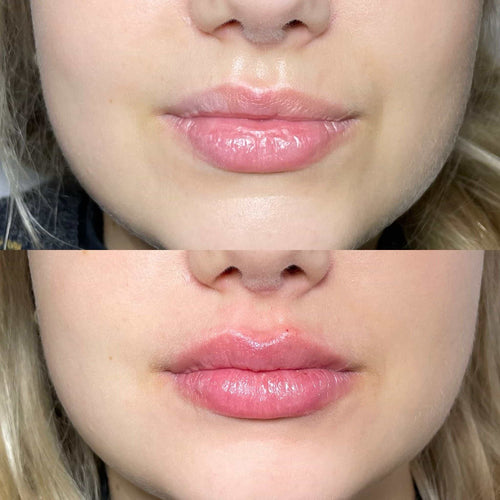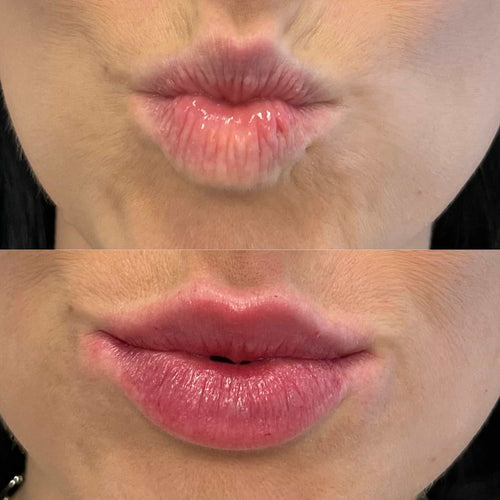Schedule a Consultation for Dermal Fillers with Dr. Laura Geige Today
Physical Requirements
Lip filler procedures, also known as lip injections or lip augmentation, are a popular cosmetic treatment aimed at enhancing the appearance of the lips by increasing their size, shape, and volume.
The American Society of Plastic Surgeons (ASPS) recommends that individuals be at least 18 years old to undergo lip filler procedures. This recommendation is based on several factors, including the potential risks associated with the procedure, the maturity of the individual’s bones and tissues, and their ability to make informed decisions about undergoing treatment.
One major concern with lip fillers is the possibility of complications such as inflammation, scarring, or uneven tissue distribution. These risks are more significant in individuals who are under 18 years old, as their bodies may not have fully developed, making it more challenging to predict the outcome of the procedure.
In addition to the physical considerations, the ASPS also takes into account the emotional and psychological maturity of potential patients. Undergoing lip filler procedures requires a certain level of self-awareness, confidence, and understanding of the treatment’s benefits and limitations.
At 18 years old, individuals have typically completed their secondary education, developed physically, and gained more life experience, which enables them to make informed decisions about undergoing cosmetic treatments. Undergoing lip fillers at a younger age may be associated with a higher risk of complications and less-than-satisfactory results.
That being said, there are certain exceptions where individuals under 18 may still be considered for lip filler procedures under the guidance of an experienced healthcare professional or plastic surgeon. For instance, individuals with rare genetic disorders that affect the development of their facial structures may benefit from early intervention, such as lip fillers.
However, these cases require careful evaluation and monitoring by a qualified medical professional to ensure the individual’s overall health and well-being are not compromised during treatment. In general, however, the ASPS recommends that individuals be at least 18 years old before undergoing lip filler procedures to minimize potential risks and maximize positive outcomes.
It is essential for individuals considering lip fillers to discuss their options with a qualified healthcare professional or plastic surgeon to determine if they are suitable candidates for treatment. By following this approach, individuals can make informed decisions about their cosmetic care and minimize the risk of complications associated with lip filler procedures.
A study conducted by researchers to investigate the motivations behind patients’ decision to undergo lip fillers, shed light on the age-related preferences and concerns that drive this cosmetic procedure.
The Journal of Clinical Aesthetic Dermatology published a comprehensive analysis of 1,000 participants who had undergone lip filler treatments, revealing significant differences in the motivations behind their choices based on age groups.
Interestingly, patients between 25-44 years old were found to be more likely to opt for lip fillers due to concerns about aging and the desire to maintain a youthful appearance.
Conversely, individuals aged 45 and above opted for procedures not only to address signs of aging but also to restore lost volume and define facial features that had been diminished by time.
The study’s findings suggest that younger patients are more concerned with maintaining a smooth and plump appearance, whereas older adults prioritize restoring facial vitality and rejuvenating their features.
Another key aspect highlighted in the study is that younger individuals tend to be more influenced by social media and societal beauty standards, which often perpetuate the ideal of full lips as a symbol of attractiveness and youthfulness.
In contrast, older patients are more likely to view lip fillers as a means to regain confidence and self-esteem after years of hormonal changes, weight fluctuations, or other lifestyle factors that can affect facial volume and elasticity.
The research underscores the importance of understanding age-related motivations and concerns when it comes to cosmetic procedures like lip fillers, highlighting the need for informed decision-making and personalized care.
Furthermore, the study’s results emphasize the value of tailoring treatment recommendations to individual patients’ needs and preferences, rather than relying on a one-size-fits-all approach.
The researchers suggest that healthcare professionals should engage in open and empathetic conversations with patients to address concerns, debunk misconceptions, and provide clear guidance on treatment options.
Medical Considerations
The FDA has set certain guidelines for lip filler injections, which are essential to consider when deciding if you’re old enough to undergo this cosmetic procedure.
Lip fillers are a popular way to enhance the appearance of the lips, but they can also have serious medical consequences if not administered properly or by an unqualified practitioner.
The FDA requires that individuals be at least 21 years old to consent to lip filler injections, as this age group is generally considered mature enough to make informed decisions about their own health and well-being.
Lip fillers contain substances such as hyaluronic acid or collagen, which are injected into the lips to add volume, smooth out wrinkles, and enhance the overall appearance of the lips.
However, these substances can also affect other areas of the face, including the nasal passages, sinuses, and skin around the mouth.
The FDA has reported several cases of complications associated with lip filler injections, including infection, allergic reactions, and scarring.
One of the most significant concerns is the potential for lip fillers to cause long-term damage to the facial structure.
The cheeks can become misshapen or lopsided due to the uneven distribution of fillers, while the lips themselves may lose their natural shape or feel unnatural after treatment.
Furthermore, some individuals have experienced more serious complications, such as difficulty breathing, vision changes, and facial numbness, which can have a significant impact on overall health and well-being.
As a result, the FDA has emphasized the importance of choosing a qualified and licensed practitioner to administer lip filler injections.
This ensures that individuals receive safe and effective treatment, while also minimizing the risk of complications or long-term damage.
In addition, it’s essential for individuals considering lip filler injections to carefully weigh the potential risks and benefits, taking into account their individual health status, medical history, and personal goals.
Ultimately, while lip fillers can be a safe and effective way to enhance appearance, it’s crucial to prioritize one’s health and well-being by choosing qualified practitioners and following proper aftercare instructions.
By doing so, individuals can enjoy the benefits of lip filler injections while minimizing the risk of complications or long-term damage.
The FDA guidelines serve as a critical reminder of the importance of responsible and informed decision-making when it comes to cosmetic procedures like lip filler injections.
The American Society of Plastic Surgeons (ASPS) recommends that individuals be at least 18 years old to undergo most cosmetic procedures, including lip fillers, in order to ensure they have reached physical and emotional maturity.
However, some medical conditions or concerns may require a patient to be older than 18, such as certain hormonal imbalances or health issues that could affect the treatment outcome.
A thorough medical evaluation by a qualified healthcare professional is essential before undergoing any cosmetic procedure, including lip fillers, to assess the patient’s overall health and determine if they are suitable for treatment.
The European Society of Cosmetology and Aesthetic Surgery (ESACS) has highlighted the importance of this pre-treatment evaluation, which should include a review of the patient’s medical history, current medications, and any existing health conditions.
Specifically, for lip filler procedures, the ESACS report recommends that patients be at least 21 years old, as this age group is more likely to have reached full physical and emotional development.
Additionally, individuals under the age of 25 may require special consideration, as their skin and lips are still developing and may not be able to tolerate certain types of fillers or procedures as well as older adults.
The ESACS report also emphasizes that patients should be in good overall health, with no significant medical conditions such as high blood pressure, diabetes, or autoimmune disorders, before undergoing lip filler treatment.
Furthermore, patients with a history of bleeding disorders, such as hemophilia, or those taking anticoagulant medications should not receive lip fillers until their condition is well-controlled and stabilized.
The ESACS report also highlights the importance of properly educating patients on the potential risks and complications associated with lip filler procedures, including temporary or permanent scarring, infection, and allergic reactions.
Patients under the age of 21 may require additional guidance and support to ensure they are fully informed and prepared for treatment, and that their safety is not compromised during the procedure.
Ultimately, the decision to undergo lip filler treatment should be made in consultation with a qualified healthcare professional or board-certified dermatologist or plastic surgeon who can assess individual patient needs and provide personalized guidance on suitability and potential risks.
A comprehensive pre-treatment evaluation will help ensure that patients are properly informed and prepared for treatment, minimizing the risk of complications and ensuring optimal results from their lip filler procedure.
Book a Consultation for Dermal Fillers with Dr. Laura Geige Today
Regulatory Guidance
The UK’s General Medical Council (GMC) provides guidance on the use of cosmetic procedures, including lip fillers, for individuals under the age of 18.
According to the GMC, patients under the age of 18 are not considered suitable candidates for cosmetic procedures like lip fillers due to ongoing physical growth and development.
The GMC states that children and adolescents are still developing physically, with significant changes occurring during puberty, which can affect their facial structure and features.
This ongoing growth and development can lead to unintended consequences when it comes to cosmetic procedures, such as lip fillers.
For example, the use of lip fillers in a child or adolescent may result in a loss of natural facial proportions, as well as unevenness or asymmetry in the face.
Additionally, children and adolescents may be more susceptible to complications from lip filler injections, such as infection, allergic reactions, or scarring.
The GMC recommends that lip fillers should only be used in individuals who are at least 18 years old, with informed consent from a parent or guardian if the individual is under 18.
However, it’s worth noting that some medical professionals may allow lip fillers to be used in children and adolescents on a case-by-case basis, if they can provide evidence of exceptional circumstances or if they are working within a research study or clinical trial.
Ultimately, the decision to use lip fillers in an individual under the age of 18 should only be made by a qualified medical professional, who has taken into account the individual’s unique needs and circumstances.
The GMC emphasizes that the safety and well-being of patients, particularly children and adolescents, should always be the top priority when it comes to cosmetic procedures like lip fillers.
The regulatory framework surrounding cosmetic procedures, including lip fillers, plays a significant role in ensuring patient safety and satisfaction.
In the context of lip filler treatments, adherence to regulatory guidelines and informed consent processes can have a profound impact on adverse outcomes.
A study published in the Journal of Plastic, Reconstructive & Aesthetic Surgery found that patients who underwent lip filler procedures with clear understanding of the risks and benefits were more likely to report improved satisfaction rates.
The study’s authors emphasized the importance of thorough informed consent processes, which involve disclosing potential complications and obtaining patient consent before proceeding with treatment.
Regulatory guidelines dictate that patients must be at least 18 years old for certain cosmetic procedures, including lip filler treatments.
However, some jurisdictions permit minors to undergo certain cosmetic procedures under specific circumstances, such as parental consent or court orders.
The American Society of Plastic Surgeons (ASPS) recommends that patients be at least 21 years old for most non-surgical cosmetic procedures, including lip fillers.

The ASPS suggests that this age restriction is due to the fact that younger patients may not fully understand the risks and benefits associated with these treatments.
Furthermore, regulatory bodies such as the FDA have guidelines in place for approving and regulating certain medications and devices used in cosmetic procedures, including lip fillers.

The FDA requires manufacturers of lip fillers to submit pre-market approval applications, which involve demonstrating the safety and efficacy of the product.
These regulations aim to ensure that patients receive safe and effective treatments, reducing the risk of adverse outcomes such as infection, scarring, or allergic reactions.
Studies have consistently shown that adherence to regulatory guidelines and informed consent processes can significantly reduce adverse outcomes and improve patient satisfaction with lip filler treatments.
Book Your Dermal Filler Session with Dr. Laura Geige Today
In addition, some countries have implemented specific regulations governing the use of lip fillers in minors, such as Australia’s National Health and Medical Research Council (NHMRC) which recommends against using dermal fillers in people under 18 years old.
It is essential for medical professionals to be aware of these regulatory guidelines and to ensure that patients fully understand the risks and benefits associated with lip filler treatments before proceeding with a procedure.
This can involve providing clear and concise information about potential complications, alternative options, and post-treatment care instructions.
Informed consent is an ongoing process, requiring healthcare providers to continually educate and update their patients on the latest information regarding lip fillers and other cosmetic treatments.
Read more about Pinnacle Wellbeing Media here. Read more about MS Style and Grace here. Read more about Line the Studio here. Read more about Alabama Sig Delt here. Read more about Carmen Alexandra here.
- Upper Face Anti Wrinkle Treatment Near Farncombe, Surrey - January 6, 2025
- When Can I Use A Straw After Lip Filler - December 21, 2024
- Exploring Teddy Lingerie For Sultry And Sophisticated Looks - December 14, 2024
